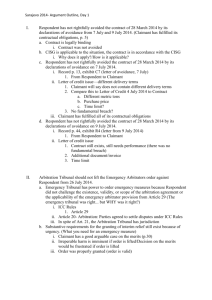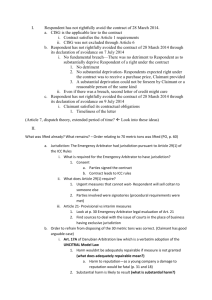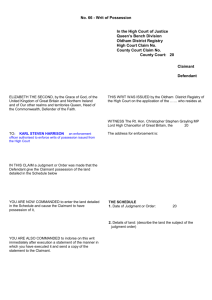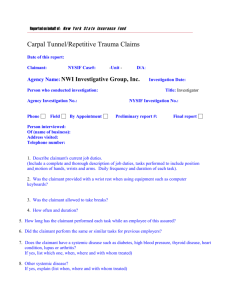Case 1 – Covert Surveillance of Employees Employment Appeals
advertisement
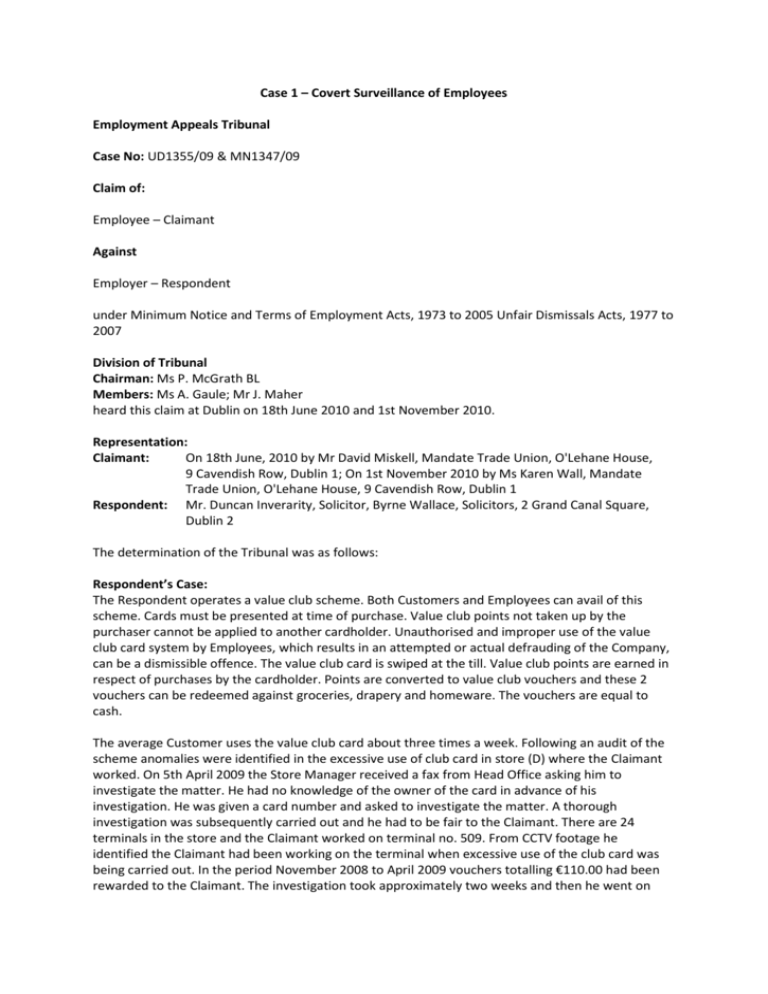
Case 1 – Covert Surveillance of Employees Employment Appeals Tribunal Case No: UD1355/09 & MN1347/09 Claim of: Employee – Claimant Against Employer – Respondent under Minimum Notice and Terms of Employment Acts, 1973 to 2005 Unfair Dismissals Acts, 1977 to 2007 Division of Tribunal Chairman: Ms P. McGrath BL Members: Ms A. Gaule; Mr J. Maher heard this claim at Dublin on 18th June 2010 and 1st November 2010. Representation: Claimant: On 18th June, 2010 by Mr David Miskell, Mandate Trade Union, O'Lehane House, 9 Cavendish Row, Dublin 1; On 1st November 2010 by Ms Karen Wall, Mandate Trade Union, O'Lehane House, 9 Cavendish Row, Dublin 1 Respondent: Mr. Duncan Inverarity, Solicitor, Byrne Wallace, Solicitors, 2 Grand Canal Square, Dublin 2 The determination of the Tribunal was as follows: Respondent’s Case: The Respondent operates a value club scheme. Both Customers and Employees can avail of this scheme. Cards must be presented at time of purchase. Value club points not taken up by the purchaser cannot be applied to another cardholder. Unauthorised and improper use of the value club card system by Employees, which results in an attempted or actual defrauding of the Company, can be a dismissible offence. The value club card is swiped at the till. Value club points are earned in respect of purchases by the cardholder. Points are converted to value club vouchers and these 2 vouchers can be redeemed against groceries, drapery and homeware. The vouchers are equal to cash. The average Customer uses the value club card about three times a week. Following an audit of the scheme anomalies were identified in the excessive use of club card in store (D) where the Claimant worked. On 5th April 2009 the Store Manager received a fax from Head Office asking him to investigate the matter. He had no knowledge of the owner of the card in advance of his investigation. He was given a card number and asked to investigate the matter. A thorough investigation was subsequently carried out and he had to be fair to the Claimant. There are 24 terminals in the store and the Claimant worked on terminal no. 509. From CCTV footage he identified the Claimant had been working on the terminal when excessive use of the club card was being carried out. In the period November 2008 to April 2009 vouchers totalling €110.00 had been rewarded to the Claimant. The investigation took approximately two weeks and then he went on holidays and upon his return the HR Manager for the store (LD) went on holidays. It was approximately five weeks before they could meet the Claimant. On 25th May 2009 the Store Manager met the Claimant and told her he had been investigating value club transactions and asked her to attend a meeting about twenty minutes later. The Store Manager, together with HR representative, LD, the Claimant and her representative attended the meeting. The Store Manager presented the Claimant with copies of stills on different dates and the Claimant did not deny that she was working on these particular dates. Customers making purchases had presented no value club card but the Claimant’s card recorded the sales. The Claimant said that sometimes the Customer tells her to take the points and sometimes the Customer gives the points to the person on the queue behind them. At the conclusion of the meeting she was suspended with pay and asked to attend a further meeting on 28th May 2009. The Store Manager sought advice from Head Office. He was very alarmed at the number of transactions that occurred. At the meeting on 28th May 2009 the Claimant said she was very sorry about what had happened and it was completely out of character. The Store Manager said it was essential that a bond of trust exists between the Employer and the Employee. He had reviewed both the number and value of transactions and believed he had no option but to terminate her employment with immediate effect. The Store Manager told the Tribunal that he had given consideration to a lesser penalty other than dismissal but he contended that the misuse of the card warranted dismissal. LD became aware of the misuse of the Claimant’s value club card when the Store Manager passed a fax to her requesting her to examine the Claimant’s value club card for the period 3rd November 2008 to 15th April 2009, a period of twenty-three weeks. She commenced the exercise on 18th April 2009. It was a long and tedious process. Her overall conclusion was that €110.00 was rewarded to the Claimant’s value club card. She presented this information to the Store Manager. They both agreed to meet the Claimant on 25th May 2009. At the conclusion of that meeting the Claimant was suspended and she was asked to attend a further meeting on 28th May 2009. The Store Manager had reviewed the situation in full and at the conclusion of the meeting on 28th May 2009 the Claimant was informed that the Company had no option to but to terminate her employment with immediate effect. LD subsequently prepared the Claimant’s letter of dismissal for signature by the Store Manager. The Claimant’s dismissal letter was a standard one used by the Respondent and the letter inadvertently issued with a date of 3rd March 2009 instead of 28th May2009. Claimant’s Case: The Claimant was employed as a sales assistant and commenced employment on 6th February 1999. The Personnel Manager conducted her induction training with her on her first day of employment and she was given an Employee handbook. At approximately 12.40 pm on 25th May 2009 the Claimant was asked to attend a meeting with the Store Manager and the HR Manager and to bring someone along with her. She had no idea what the meeting was about. The Store Manager opened the meeting and said he wanted to clear up a few things and have a chat with her. The Claimant was questioned on what she understood the terms were for the use of the value club card. Issues had arisen with the use of her card and these were pointed out to her. The Claimant said that in the event that Customers forget their value club cards sometimes they tell her to take the points. The Customers always gave her permission to accept their points and it had never occurred to her that she was doing anything wrong in accepting these points. She was fully aware that other members of staff were doing likewise and she pointed this out at the meeting on 25th May 2009. The Store Manager said it was a serious matter and the abuse of the value club scheme could result in dismissal. She was suspended until 28th May 2009 and was asked to attend a further meeting on that day. She deemed that the minutes of the meeting were not true and accurate. She was informed that she was being dismissed at the conclusion of that meeting. August 2008 had been a stressful time for her as her husband had lost his job and she tried to explain that it was totally out of character. The Claimant appealed the decision to dismiss her on 2nd June 2009. She was not invited to an appeal hearing. The Regional Manager, who determined her appeal formally, wrote to her 15th June 2009 affirming the decision to terminate her employment. The Claimant has been ill since the termination of her employment. She was initially in receipt of social welfare payments and then in receipt of disability benefits and not worked since her dismissal. Determination: The Tribunal has carefully considered the two days of evidence heard. The Respondent has taken the very firm line that the inappropriate use of the value club card amounts to fraud and theft and therefore must result in a termination of employment for gross misconduct. In reply the Claimant put up the argument that the addition of value club card points was often at the discretion of generous Customers and that the practice was not unusual in the retail shop albeit she did seem to accept that the practice would not necessarily be condoned by management. In forming any decision, the Tribunal must consider the reasonableness of both parties’ conduct, actions and decisions. The Respondent pointed to their own handbook as being the source of the rules and practices appropriate to the workplace. The reference to the misuse of the value club card is unavoidable therein but the proposition that all Employees know the content of the handbook inside out and refer to it daily is not sustainable. The onus is on the Respondent to update and remind Employees of what is expected of them in the workplace at staff meetings, circulars and through notifications on staff notice boards. It seems to the Tribunal that the Respondent was alerted by head office of an irregular use of the card. In response the Respondent conducted a covert operation involving CCTV footage studies and an analysis of till receipts. It was open to the Company at this point to generally alert staff that the inappropriate use of value club cards would not be condoned and remind staff of the handbook statements in this regard. The Respondent did not choose to do this and instead narrowed down its investigation to an Employee of ten years standing with an untainted work record. The Respondent was entitled to discover the nature of the unusual pattern but the Tribunal questions whether the Respondent was correct in allowing the Claimant continue using her value club card in the manner she was without generally notifying the workforce that such card use was unacceptable. The Tribunal must ask itself whether such an approach was reasonable. Of greater concern to the Tribunal was the proportionality of the sanction to the actions complained of in circumstances where a reasonable explanation had been given. The Tribunal fully accepts that Customers might well from time to time say to an Employee to take the benefit of points earned through their purchases and which have no value to a particular Customer. The Claimant could see little harm in taking the benefit of something, which would otherwise be lost to the system. The Claimant did not necessarily see it from the Respondent’s perspective. The Respondent is entitled to stop this practice but the Tribunal cannot find that a dismissal for gross misconduct is an appropriate and proportionate response in all the circumstances. In addition, the Tribunal cannot accept that the appeal conducted internally by the Respondent had any regard for the principles of natural justice. It was unreasonable to conduct an appeal without reference to the Claimant and this is a practice that needs revision by the Company. In concluding and based on all the evidence, the Tribunal finds that the Claimant was unfairly dismissed and her claim under the Unfair Dismissals Acts, 1977 to 2007 must succeed. The Tribunal awards the Claimant the sum of €24,000.00. The Tribunal also awards the Claimant €2190.00 being the equivalent of six weeks’ notice under the Minimum Notice and Terms of Employment Acts, 1973 to 2005.

